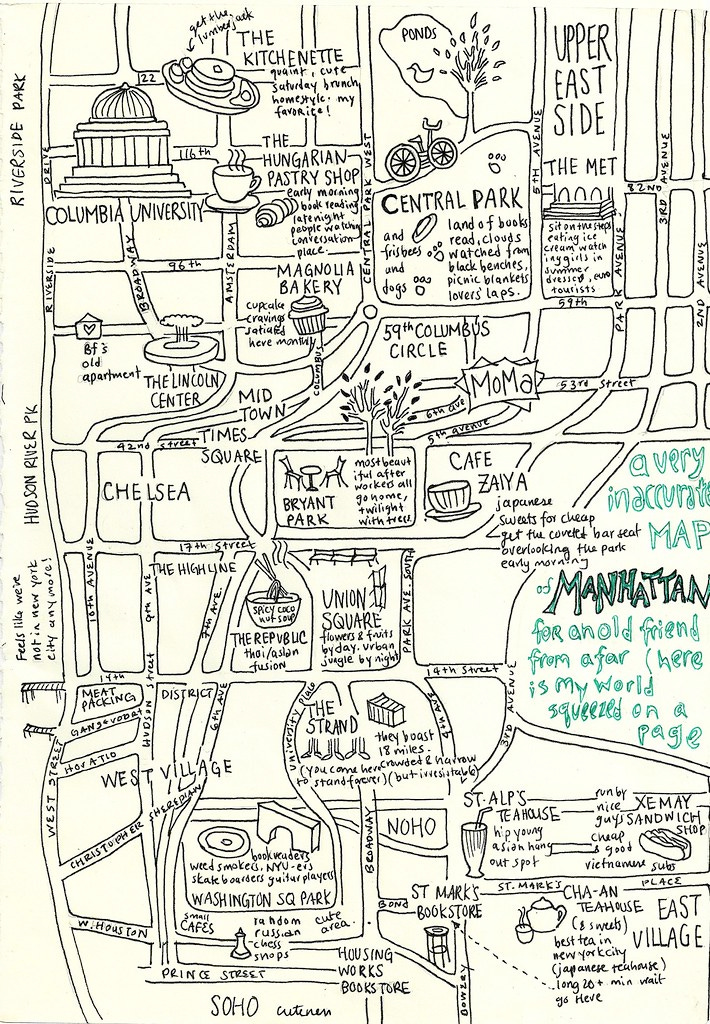Once, back in the era of handwritten letters, I forgot my friend’s house number. I knew their city, their street, even their zip code. So I addressed it to all of that, and then “the big gray house on the corner, either 23 or 25.” That letter did not to my friend. The US Post Office has a romance with rules.
But the rest of us humans find our way around in so many ways besides numbers. I love thinking of maps as stories, which they are, because all human journeys are stories. Landscape is overlaid with memory and association. I use map-making in many ways in my class – to help children integrate our outdoor adventures, as pre-writing in fiction work, as a way to tell a story in and of itself, and yes as a poetry prompt.
Personal maps, public places
An old boyfriend and I had an unrealized idea for a public art project where people would leave some kind of markers, perhaps stenciled hearts, all around Seattle’s bar-filled Capitol Hill to mark the location of first kisses. There were all kinds of hurdles to the project, largest being our own follow-through, not to mention that our cute little stencil-hearts didn’t hold space for the complexity and darkness in human romance, but some part of me loves the idea of that many personal stories marked into public space.
“Lauren Gives Me Directions,” holds some of the same spirit. I love this poem, which was published in Zócalo Public Square and which I stumbled on while lurking on literary Twitter. I wish my GPS robot gave directions like Lauren. And I think it’s useful for kids growing up in a GPS era to discover their own internal maps, with locations like the corner I saw the wizard on a Segway, instead of N.E. 393rd St.
Lauren gives me directions
By Garrett Durbin
“Make a left at the second park,
Because you will come across two parks;
The first one is smaller, and there’s a little courtyard in the middle
With an old fountain, inlaid with a bird – a dove, I think –
A friend of mine once told me the future
Is authenticity, there, while I was crying,
But you must pass that one and turn left
At the end of the larger, uglier one.“You will pass a shop, called only ‘J.P.,’
That sells the most beautiful scarves, in any season;
I always – you can just glance if you want,
But I always stop to look, though I have to avoid the manager
Because I told him that sometimes I – ha ha! – sometimes it takes all of my strength,
From the hospital, not to break that window!“You will pass – and this is where I start to skip –
A morose jazz club,
Where the melancholy spills out onto the street
With the music and the smoke,
Where I once saw a bunch of children – this was years ago –
Five of them, all germinating verve and towheaded androgyny,
Skipping down the cobblestone, hand in hand, laughing, and it looked
As if the smokers outside were vermillion with jealousy –
Or maybe just the cold –
Anyway, I remember them and skip for them, now;
I think that’s important.“It’s important that we keep skipping, or – well, anyway, that I do,
Because you will pass the casino, and the old men in the windows
At the machines, exchanging misery;
They will look at you, so look back, and they will spit at you, so never stop
Skipping; you must be resolute, or I – I must be resolute, when they see me.“I think it is a cruel thing, to be happy.”
Glasses off, and on.
“Sorry, I hope you’re not in a rush,
It’s just so wonderful to see you smiling, and breathless,
And I know you pay attention, so I told you all that.
You look so happy here – like a beaming cartoon! Not like last year,
By the Mylar, in that dark apartment –
You look like you want to be free.”
The prompt is:
Tell someone how to get somewhere using memories.




